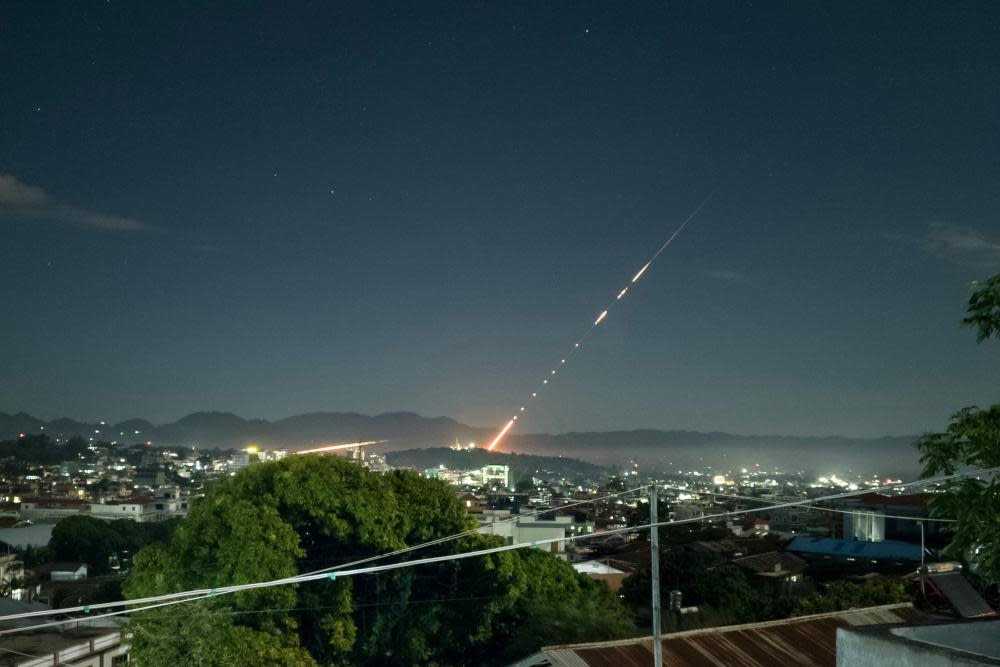Myanmar junta facing biggest challenge yet after new offensive by armed groups, analysts say

Myanmar’s military is facing its biggest military challenge since it seized power in a coup more than two years ago, after an alliance of opponents cut off key trading routes and seized towns and dozens of outposts near the Chinese border.
The offensive in northern Shan state, which was launched by an alliance of ethnic armed groups in coordination with newer anti-coup groups, is a significant blow for the military, analysts say, and could be exploited by the wider pro-democracy resistance movement.
Their offensive has been met with airstrikes by the military, according to reports, with junta chief Min Aung Hlaing vowing to counter their advances. It remains to be seen if the groups can retain the territory taken.
On Monday, the UN warned the heavy fighting had caused civilian casualties and displaced more than 30,000 people.
Related: US sanctions Myanmar’s junta-controlled state oil and gas enterprise
Tar Parn La, a spokesperson and deputy general of Ta’ang National Liberation Army, one of three groups forming the Brotherhood Alliance, which led the operation, told the Guardian it had taken more than 100 military outposts. It is not possible to verify this claim.
The military conceded last week that it had lost several towns, including the strategic town Chinshwehaw, which borders China’s Yunnan province. Between April and September this year, more than a quarter of Myanmar’s $1.8bn worth of border trade with China passed through the town.
The escalation in fighting has underlined Myanmar’s strained relations with Beijing, one of its few remaining allies. China has called for stability on the border and has for months been signalling its desire for Myanmar to crack down on criminal scam operations targeting its nationals, which are booming in the area. Analysts say the military has failed to take action, but the Brotherhood Alliance has now promised to do so.
Myanmar’s military seized power in a coup in February 2021, and has since faced determined opposition from the public, including many who took up arms and formed people’s defence forces to overthrow its rule. Such groups have also received support from some ethnic armed organisations, which have for decades fought with the military for greater independence.
The offensive, which began on 27 October, was led by the Brotherhood Alliance includes three ethnic armed groups: the Myanmar National Democratic Alliance Army, The Ta’ang National Liberation Army, and the Arakan Army.
That the operation managed to progress so rapidly reflects the low morale and pressure on military resources, said Richard Horsey, Myanmar adviser to International Crisis Group, a non-profit that produces analysis of conflicts around the world. It was a risky moment for the military, he said, but added that it was unclear how the offensive would play out.
“It’s either going to show the Myanmar military is much, much weaker than people thought – and then other groups might take that to be a signal that… now is the right time for war. Or, if [the military] are able to muster a fairly forceful response, people may [decide] we should just lie low,” Horsey said.
A local resident of Lashio in northern Shan state told the Guardian that in the early hours of 27 October, as the offensive began, she could see missiles landing on military camps, in the mountains, about a 15-minute drive away.
“Northern Shan state is no stranger to armed conflict, but I haven’t seen this many missiles before, nor this close before,” she said. On the third day, there were quite a lot of Myanmar military jets and helicopters flying above the city, she added.
“Sometimes, my house was shaking for a few times in the past few days,” she added.
China’s assistant foreign minister Nong Rong said on Monday that Beijing called upon Myanmar to “earnestly ensure the safety of the lives and property of Chinese border area residents, and take effective measures to strengthen the security of Chinese personnel, institutions and projects in Myanmar”.
Analysts are divided over whether China approves of the Brotherhood Alliance’s operations, or had advance knowledge of it. Beijing has ties with armed groups along its border – though it has denied supplying them with weapons. Its relationship with the Myanmar military has long been complicated, and has become increasingly fraught after the coup.
“[China] had been trying to entertain the idea that maybe it could work with the military towards making rapid progress towards its geo-strategic advancements in Burma – including building the China-Myanmar economic corridor, advancing the railroad,” said Jason Towers, country director for the Burma program at United States Institute of Peace. It had become clear the junta has no legitimacy or ability to implement such projects, however, he added.
There has also been growing concern in China over scam operations that have proliferated in Myanmar since the coup. Chinese officials had signalled in strong language their desire for Myanmar to take action, but instead, such activities had expanded further in the country, Towers said.
Related: Myanmar: at least 29 people killed in attack on camp for displaced people
Maung Saungkha, a prominent poet who joined the armed resistance after the coup, and whose group Bamar People Liberation Army, had coordinated with the Brotherhood Alliance, said last week’s operations had already prompted wider waves of attacks against the military across the country.
“Everyone sees what happened in the northern Shan state. There will be more waves like this, one wave after another. As this wave is a huge one, the other one will be as huge as this one,” he said.


